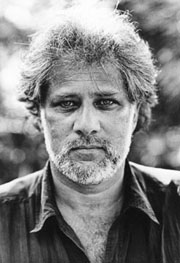Ladies and gentlemen, ghosts and children of the state,
I am here because I could never get the hang of Time.
This hour, for example, would be like all the others
were it not for the rain falling through the roof.
I'd better not be too explicit. My night is careless
with itself, troublesome as a woman wearing no bra
in winter. I believe everything is a metaphor for sex.
Lovemaking mimics the act of departure, moonlight
drips from the leaves. You can spend your whole life
doing no more than preparing for life and thinking.
"Is this all there is?" Thus, I am here where poets come
to drink a dark strong poison with tiny shards of ice,
something to loosen my primate tongue and its syllables
of debris. I know all words come from preexisting words
and divide until our pronouncements develop selves.
The small dog barking at the darkness has something to say
about the way we live. I'd rather have what my daddy calls
"skrimp." He says "discrete" and means the street
just out of sight. Not what you see, but what you perceive:
that's poetry. Not the noise, but its rhythm; an arrangement
of derangements; I'll eat you to live: that's poetry.
I wish I glowed like a brown-skinned pregnant woman.
I wish I could weep the way my teacher did as he read us
Molly Bloom's soliloquy of yes. When I kiss my wife,
sometimes I taste her caution. But let's not talk about that.
Maybe Art's only purpose is to preserve the Self.
Sometimes I play a game in which my primitive craft fires
upon an alien ship whose intention is the destruction
of the earth. Other times I fall in love with a word
like somberness. Or moonlight juicing naked branches.
All species have a notion of emptiness, and yet
the flowers don't quit opening. I am carrying the whimper
you can hear when the mouth is collapsed, the wisdom
of monkeys. Ask a glass of water why it pities
the rain. Ask the lunatic yard dog why it tolerates the leash.
Brothers and sisters, when you spend your nights
out on a limb, there's a chance you'll fall in your sleep.
-Terrance Hayes
(Thanks, Michelle)











